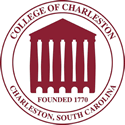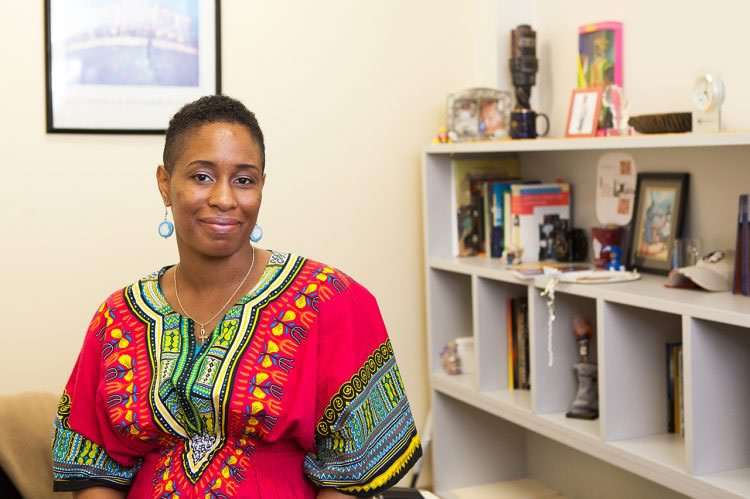Special from the College of Charleston | For Kameelah L. Martin, director of African American Studies at the College of Charleston, it was the Lowcountry’s rich ties to the African-American community and heritage that drew her to join the faculty in fall 2017. Martin, who holds a bachelor’s degree in English from Georgia Southern University, a master’s in Afro-American Studies from the University of California, Los Angeles, and a doctorate in English from Florida State University, came to the College after serving on the faculty of Savannah State University where she taught in the Department of English, Language, and Cultures.
 As a literary scholar, Martin, who teaches both English and African American Studies at CofC, is interested in African-American culture, feminism and spirituality – interests which are reflected in her two books, Conjuring Moments in African American Literature: Women, Spirit Work, and Other Such Hoodoo and Envisioning Black Feminist Voodoo Aesthetics: African Spirituality in American Cinema.
As a literary scholar, Martin, who teaches both English and African American Studies at CofC, is interested in African-American culture, feminism and spirituality – interests which are reflected in her two books, Conjuring Moments in African American Literature: Women, Spirit Work, and Other Such Hoodoo and Envisioning Black Feminist Voodoo Aesthetics: African Spirituality in American Cinema.
“I was most drawn to the history of Charleston and its importance to African-American culture,” says Martin. “My secondary area of study is folklore and the Gullah Geechee culture is a huge part of my interest. I teach about and research the region, so it was very attractive as a place to put down roots – or replant them!”
She adds, “There is a lively belief and practice of African derived spirituality and traditions in Charleston that allows my teaching and research to come alive in ways that are unmatched elsewhere.”
The indelible mark of African-American history and culture on the Holy City is what makes the College such a unique place to study black history.
The College Today posed a few questions to Martin on the history behind Black History Month, why it’s important and the value of teaching black history through the field of African American Studies.
What are the origins of Black History Month?
Black history month was originally known as Negro History Week – a celebration that was organized and advocated by Dr. Carter G. Woodson in 1926. Woodson is most well-known for penning The Miseducation of the Negro and for founding the Association for the Study of African American Life and History in 1915.
What are some of the key elements of black history in the United States? Why are they important?
Black history is important and inextricable from United States history and the history of the Black Atlantic World. We Americans practice a selective amnesia that allows us to continue the myth that these two histories are not tied to each other. Societal biases, the history of racism, and the ideology of the “Lost Cause” has privileged the history of Anglo-Americans for so long that the history and culture of African-Americans – which reaches back further than pre-revolutionary America – has gone unnoticed, unacknowledged, and unappreciated. The value of black history is that it tells a more complete American history. For instance, you cannot talk about the history of American or Southern cuisine without talking about the African culinary retentions of enslaved people and their cultural exchange with the Master class. It just can’t be done.
Black history is complex and varied. How do you approach the subject within the context of African American Studies?
The beauty of approaching Black history through the lens of African American Studies is that we are a multidisciplinary field. I am trained as a literary scholar, but I am able to blend and fold in other disciplinary fields such as folklore, linguistics, musicology, religion, and history when teaching my students how to interpret and understand the cultural subtext on the page. I believe students learn best when they understand the historical and cultural context of a thing – whether that is reading the meaning of an Adinkra symbol in the New York African Burial Ground or deconstructing the linguistic sophistication of a Kendrick Lamar verse. You can’t know a people without fully knowing the history out of which the culture developed.
What are some essential books students should consider reading to be more familiar with important African American historical figures and events?
There are so many I could name! I’m going to take the liberty of adding African American culture along with historical figures and events. I’ll try to keep it brief:
- Up From Slavery by Booker T. Washington;
- The Autobiography of Malcolm X. by Malcolm X and Alex Haley;
- Lose Your Mother: A Journey Along the Atlantic Slave Route by Saidiya Hartman;
- i by Toni Morrison;
- Slave Religion: The Invisible Institution by Albert J. Raboteau;
- Invisible Man by Ralph Ellison; and
- Toward an Intellectual History of Black Women edited by Mia Bay and Martha S. Jones.
How do we connect historical events involving African-Americans to present-day issues?
I think the first step is to acknowledge the historical experiences of African-Americans that have led to the perpetuation and legalization of racism and discrimination in this country. Refusing to confront the imperfect past is the very thing that allows us to continue practices of racial profiling, social biases against black people, and all of the other unspeakable acts against people of color in this country.
The very same prejudices, inhumanity, and moral ineptitude that allowed chattel slavery to exist and thrive are the same prejudices, inhumanity and moral ineptitude that empower some white cops/men to kill unarmed black men, women, and children. It is the same sentiment that led the leader of our nation to deride Haiti and African countries as undesirable. If we have an honest look at American history, it tells us all the things we need not repeat in order to form a more perfect union. If our education system would be bold enough to confront the ugly, racist, unjust past of American history and politics, we could raise generations of citizens who better understood what is at stake when we cultivate a culture of hate via selective amnesia and a discomfort with difference. That is how we move toward progress, by understanding the mistakes of the past and how they affect the present moment.
- Have a comment? Send to: editor@charlestoncurrents.com




 We Can Do Better, South Carolina!
We Can Do Better, South Carolina!
























